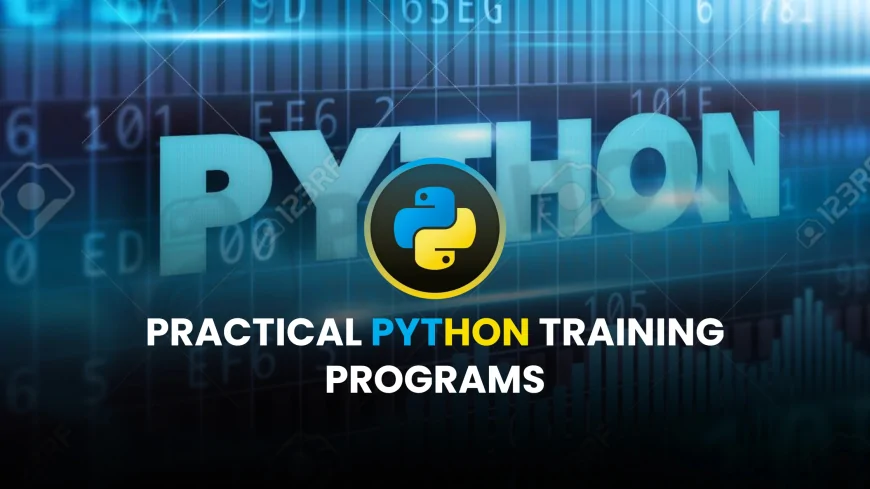Learn Python Scripting with Hands-On Projects in Pune | Hands-On Python Scripting Training Programs in Pune

Table of Contents
- Overview
- Why Learn Python Scripting?
- Benefits of Hands-On Python Scripting Courses
- Who Should Join?
- Key Skills Covered
- Hands-On Projects You Will Build
- Typical Course Structure
- Certification & Credentials
- Online and Offline Learning Options in Pune
- Popular Tools and Libraries Used
- Career Opportunities After Learning Scripting
- Top Institutes in Pune for Python Scripting Training
- Course Fees and Duration
- Internship and Job Support
- Placement Record of Leading Institutes
- FAQs
- Conclusion
Overview
Python scripting is revolutionizing automation, data processing, and system management. In Pune, a major IT and tech education hub, several institutes offer in-depth Python scripting training with hands-on projects. These programs provide practical exposure to real-world scenarios, preparing you for roles in automation, DevOps, software testing, data manipulation, and more.
Why Learn Python Scripting?
Python scripting enables you to automate repetitive tasks, parse files, manage data, and even build functional tools and utilities. It’s widely used in QA testing, system administration, cloud automation, and more. Learning scripting can save time, reduce manual errors, and significantly boost your productivity as a developer or tech professional.
Benefits of Hands-On Python Scripting Courses
- Work on real-world automation scenarios
- Understand Linux/Windows scripting environments
- Learn through error-driven debugging sessions
- Apply Python to files, logs, APIs, databases, and CLI tools
- Become job-ready for DevOps, automation, and QA roles
Who Should Join?
- College students or freshers entering tech roles
- System administrators and support engineers
- Software testers and QA professionals
- DevOps engineers and cloud professionals
- Anyone interested in task automation and scripting
Key Skills Covered
- Python syntax and scripting style
- Working with files and directories
- Command-line scripting
- Automating system and server tasks
- Interacting with APIs using requests
- Error handling and exception logging
- Scripting with CSV, JSON, and XML data
Hands-On Projects You Will Build
- Log file analyzer for server monitoring
- Web scraping bot using BeautifulSoup
- Directory cleaner script with file filter logic
- Automated email sender with SMTP integration
- API-based data fetcher and storage
- Database backup and restore scripts
Typical Course Structure
- Week 1–2: Python fundamentals for scripting
- Week 3–4: System automation and file handling
- Week 5–6: Web scraping, APIs, and JSON scripting
- Week 7–8: Advanced automation + project building
- Final Week: Certification exam + interview prep
Certification & Credentials
Courses offer either institute-level certifications or prepare you for global certifications like PCEP (Certified Entry-Level Python Programmer) or PCAP. These add credibility and value to your resume.
Online and Offline Learning Options in Pune
- Online: Ideal for working professionals with recorded + live sessions
- Offline: In-classroom experience in hubs like Aundh, Kharadi, Baner
- Hybrid: Weekend and evening flexible batches
Popular Tools and Libraries Used
os,shutil,subprocess– For system tasksrequests,json,re– For APIs and data parsingargparse– For command-line toolslogging– For script debugging
Career Opportunities After Learning Scripting
- Python Automation Engineer
- DevOps Scripting Specialist
- QA Engineer (Automation)
- Data Operations Executive
- System Admin with Python skills
Top Institutes in Pune for Python Scripting Training
Why Choose WebAsha for Scripting
-
Instructor-led training for scripting and automation, covering file I/O, system tasks, network scripting, CGI, multithreading, GUI, and more
-
Live projects & case studies embedded in the course, helping learners build scripts that tackle real-world problems .
-
Job-oriented syllabus and dedicated placement support, especially beneficial for freshers
-
Small batch size enables personalized attention and effective project monitoring
-
Curriculum includes global certification prep, aligning with recognized standards
Curriculum Highlights
Below are some key scripting-related topics included in WebAsha’s Python program:
-
File Handling & I/O: Reading/writing files, exceptions, input/output operations
-
CGI & Networking: Building scripts for web forms, socket programming for client/server applications
-
Multithreading & Automation: Writing concurrent scripts to optimize performance
-
GUI with Tkinter: Developing desktop automation tools using GUI elements
These modules focus on practical scripting, enabling learners to create automation utilities, system modules, and more.
Course Delivery & Features
-
Live sessions (online/offline) covering scripting topics in interactive format
-
Small batches and flexible scheduling—weekday, weekend, and evening sessions
-
Post-training support, including placement assistance, demo scripts, and Q&A sessions
-
Affordable and accessible, with clear pricing and EMI/group discount options
Course Fees and Duration
Duration
-
Full Python Programming Course (incl. scripting modules): 1.5 to 3 months (approx. 6–12 weeks)
-
Classroom & Online options: available in flexible schedules—weekday, weekend, evening batches
Fees
Core Full-Stack Python Course:
-
While the exact fee isn’t listed, classroom programs (e.g., web design) range ₹23,000/month; similar structure suggests Python courses likely around ₹30,000–₹60,000 total
Scripting/Certification-Centric Training:
-
Described as "affordable course fee" and includes exam voucher for global certification
-
Offers group discounts and EMI options
Overview Table
| Course Type | Duration | Approximate Fee | Payment Options |
|---|---|---|---|
| Full Python Programming (incl. Scripting) | 1.5–3 months | ₹30,000–60,000 (estimate) | One-time / EMI / Group discounts |
| Certification-Focused Scripting Course | ~6–8 weeks | Included in affordable pricing; includes exam voucher | EMI & group options |
Internship and Job Support
Many institutes provide internship letters or live project experience. Some offer mock interviews, resume reviews, and job referrals in Pune’s growing tech ecosystem.
Placement Record of Leading Institutes
Institutes like WebAsha and Ethans Tech boast placement support of up to 90% with companies hiring for scripting roles in automation, DevOps, and QA.
Frequently Asked Questions (FAQs)
1. What is Python scripting used for?
Python scripting automates tasks, manages data, interacts with APIs, and handles system-level operations efficiently.
2. Is scripting different from programming?
Scripting is a subset of programming, focused on automating tasks or performing quick routines instead of building full-scale applications.
3. Can beginners learn Python scripting?
Yes, Python is beginner-friendly, and scripting is a great way to start learning real-world coding.
4. Do scripting courses include projects?
Yes, most quality scripting courses in Pune include real-world projects like automation tools, log analyzers, or scraping bots.
5. Are certificates provided?
Yes, all reputed institutes provide a certificate of completion and may guide you for global certifications like PCEP or PCAP.
6. What jobs can I get after learning scripting?
You can work as an automation engineer, QA tester, Python developer, or system admin with scripting skills.
7. Is scripting part of DevOps?
Absolutely. DevOps professionals heavily rely on scripting for CI/CD pipelines, server setup, and automation.
8. What is the average salary after such courses?
Freshers with Python scripting skills can earn ₹3.5–6 LPA; experienced professionals can earn much more.
9. Do I need to know Linux for scripting?
Basic Linux knowledge is helpful but not mandatory to start.
10. Which is better – scripting or full-stack Python?
It depends on your goal. Scripting is better for automation roles, while full-stack is for app development.
11. Is web scraping taught in scripting courses?
Yes, most courses include BeautifulSoup or Selenium for web scraping basics.
12. Can I automate Excel using Python scripting?
Yes, using libraries like openpyxl or pandas, you can automate Excel tasks.
13. Will I work on live projects?
Many institutes offer real-time projects as part of the course or via internships.
14. Are online scripting courses effective?
Yes, if they include mentor support, recordings, and project-based assignments.
15. How long does it take to master scripting?
Typically 6 to 8 weeks for proficiency with real-time practice.
16. Can I use Python scripting for cybersecurity?
Yes, scripting is widely used for writing scanners, automation tools, and log monitoring in security.
17. Do I need to know object-oriented programming for scripting?
Basic understanding is enough; scripting emphasizes functional and procedural logic more.
18. Will this help in interviews?
Yes, Python scripting skills are frequently tested in technical interviews, especially for automation roles.
19. Are job referrals provided?
Institutes like WebAsha provide placement support and job connections.
20. Can I create my own tools after this course?
Absolutely. You’ll learn how to build and deploy your own Python-based automation or utility scripts.
Conclusion
Learning Python scripting with hands-on projects in Pune is a smart move for anyone seeking automation skills, job-ready credentials, and practical coding knowledge. These courses combine the best of structured learning and real-world experience. Whether you aim for a DevOps, QA, or scripting-focused developer role, this path will prepare you with the tools, mindset, and certification to succeed.
What's Your Reaction?
 Like
0
Like
0
 Dislike
0
Dislike
0
 Love
0
Love
0
 Funny
0
Funny
0
 Angry
0
Angry
0
 Sad
0
Sad
0
 Wow
0
Wow
0














